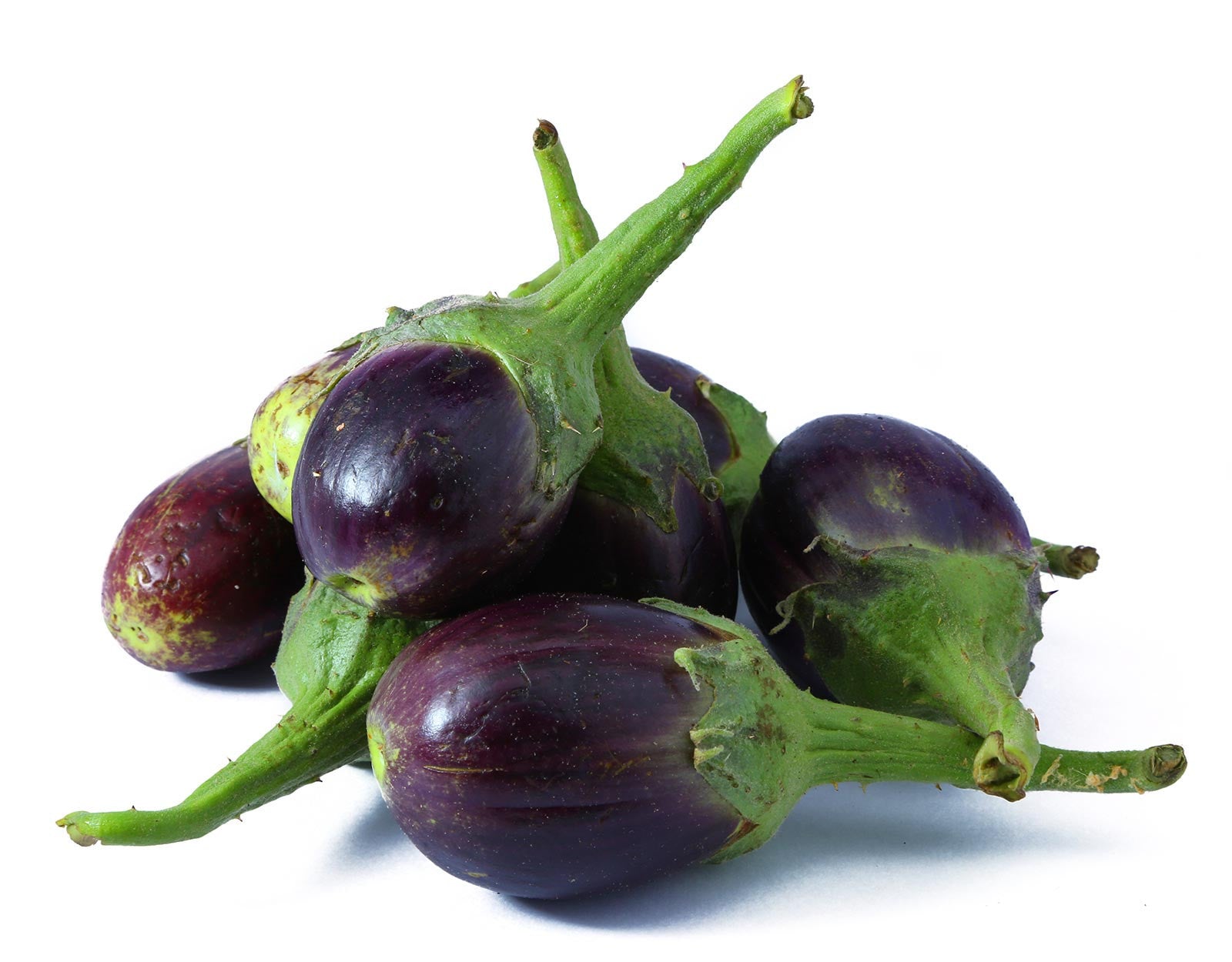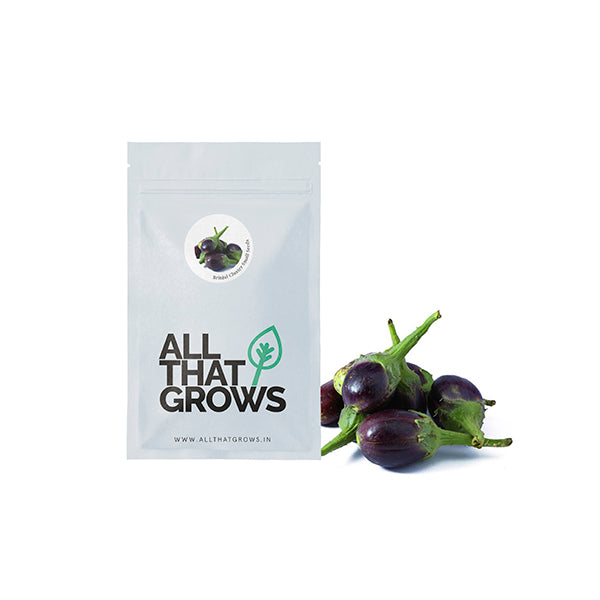



Brinjal Cluster Small Seeds
Seed Type : Non-Hybrid, Open Pollinated and Non-GMO
Fruit Color : Blackish in colour, calyx green, highly acceptable
Fruit shape : Oval
Fruit Weight : 60-80 gms
Maturity : After 90 - 100 days from sowing
Specifications: Very heavy yielding , fruits bear in bunches
- SOWING
TIMEFeb - Mar
Jun - Jul - Sowing
DistancePlant to plant - 1'
Line to line - 1.5' - Fruit
Weight60-80 gms
- Fruit
Shapeoval
- Days to
maturity90 - 100 days
- Details
- How to sow
- Reviews
Yet another variant of the versatile vegetable, the chu chu or small cluster produce has a distinct flavor with all the benefits of brinjals intact. Brinjals, also known as the Eggplant and Aubergine in the west and as Baingan and Bataun in some countries of South Asia including India, are a low calorie vegetable with a high nutritive value. Rich in B-Vitamins, intake of brinjals helps in keeping blood pressure in check while also lowering bad cholesterol levels. High in fibre, these aid in proper digestion while preventing constipation and the risk of colon cancer. Eating brinjals also promotes healthy looking hair and skin because of a high water content.
Brinjals can be cooked both peeled and unpeeled. For these mini eggplants, you just need to cut slits and stuff them with spices before frying for a mouth-watering savory dish. Another unique quality of brinjals is their ability to be made into a healthful dip that acts as an accompaniment with snacks. You can also roast, grill or steam them as per your taste and preference.
Planting instructions
Soak the seeds overnight to promote germination.
Start planting indoors 2 months before the soil warms up and keep in a warm place inside the house.
Sow seeds about 10 mm, 24 to 30 inches apart in well-prepared beds.
Transplant the seedlings when they have grown a couple of leaf sets.
Pinch out the terminal growing tips for a bushier plant.
Growing Requirements
watering
Evenly moist soil ensures faster growth. Do not overwater or allow the soil to dry out.
pests
The crop is vulnerable to the following pests - Aphids, Spider Mites, Tomato Hornworms, Downy and Powdery Mildew. Eggplant fruit may not ripen properly due to cold temperatures, pest damage, or infertile soils. Symptoms of crop infection include wilting of leaves, followed by the edges of the leaves becoming dry, brittle and eventually turning brown. The area between the veins in eggplant leaves may also become yellow. The plant's entire vascular system including the roots and stems gets affected leading to its collapse.
soil
Eggplant prefers a sandy soil with a pH of 5.5 to 6.8.
spot
Grow eggplant in full sun
temperature
This crop requires a moderate warm temperature and it cannot withstand frost. Brinjal requires a minimum temperature of 18 C (65 F) during early growth, but optimal temperature is in the range of 24–27 C (75-80 F)
how to harvest
Harvest 16 to 24 weeks after sowing, when the skin of the fruit is shiny and unwrinkled.
Cut the fruit close to the stem and leave about an inch of it attached.
Eggplants can be stored for up to two weeks in humid conditions.

The productiveness of any seed we sell is subject to your local climatic conditions*, the sowing method you adopt, and your commitment to the planting process. We give no warranty, expressed or implied, and are in no way responsible for the produce.
Please note that all our seasonal recommendations/ sowing information is as per the local climatic conditions. *For more information on the optimum conditions required for growing seeds in your region, please contact us at, hello@allthatgrows.in or Whatsapp us at, +91 8544865077
Questions & Answers
Have a Question?
Be the first to ask a question about this.




Brinjal Cluster Small Seeds
Seed Type : Non-Hybrid, Open Pollinated and Non-GMO
Fruit Color : Blackish in colour, calyx green, highly acceptable
Fruit shape : Oval
Fruit Weight : 60-80 gms
Maturity : After 90 - 100 days from sowing
Specifications: Very heavy yielding , fruits bear in bunches
Yet another variant of the versatile vegetable, the chu chu or small cluster produce has a distinct flavor with all the benefits of brinjals intact. Brinjals, also known as the Eggplant and Aubergine in the west and as Baingan and Bataun in some countries of South Asia including India, are a low calorie vegetable with a high nutritive value. Rich in B-Vitamins, intake of brinjals helps in keeping blood pressure in check while also lowering bad cholesterol levels. High in fibre, these aid in proper digestion while preventing constipation and the risk of colon cancer. Eating brinjals also promotes healthy looking hair and skin because of a high water content.
Brinjals can be cooked both peeled and unpeeled. For these mini eggplants, you just need to cut slits and stuff them with spices before frying for a mouth-watering savory dish. Another unique quality of brinjals is their ability to be made into a healthful dip that acts as an accompaniment with snacks. You can also roast, grill or steam them as per your taste and preference.
Seed Type : Non-Hybrid, Open Pollinated and Non-GMO
Fruit Color : Blackish in colour, calyx green, highly acceptable
Fruit shape : Oval
Fruit Weight : 60-80 gms
Maturity : After 90 - 100 days from sowing
Specifications: Very heavy yielding , fruits bear in bunches
- SOWING
TIMEFeb - Mar
Jun - Jul - Sowing
DistancePlant to plant - 1'
Line to line - 1.5' - Fruit
Weight60-80 gms
- Fruit
Shapeoval
- Days to
maturity90 - 100 days
Planting instructions
Soak the seeds overnight to promote germination.
Start planting indoors 2 months before the soil warms up and keep in a warm place inside the house.
Sow seeds about 10 mm, 24 to 30 inches apart in well-prepared beds.
Transplant the seedlings when they have grown a couple of leaf sets.
Pinch out the terminal growing tips for a bushier plant.
Growing Requirements
watering
Evenly moist soil ensures faster growth. Do not overwater or allow the soil to dry out.
pests
The crop is vulnerable to the following pests - Aphids, Spider Mites, Tomato Hornworms, Downy and Powdery Mildew. Eggplant fruit may not ripen properly due to cold temperatures, pest damage, or infertile soils. Symptoms of crop infection include wilting of leaves, followed by the edges of the leaves becoming dry, brittle and eventually turning brown. The area between the veins in eggplant leaves may also become yellow. The plant's entire vascular system including the roots and stems gets affected leading to its collapse.
soil
Eggplant prefers a sandy soil with a pH of 5.5 to 6.8.
spot
Grow eggplant in full sun
temperature
This crop requires a moderate warm temperature and it cannot withstand frost. Brinjal requires a minimum temperature of 18 C (65 F) during early growth, but optimal temperature is in the range of 24–27 C (75-80 F)
how to harvest
Harvest 16 to 24 weeks after sowing, when the skin of the fruit is shiny and unwrinkled.
Cut the fruit close to the stem and leave about an inch of it attached.
Eggplants can be stored for up to two weeks in humid conditions.



 Sign In
Sign In








